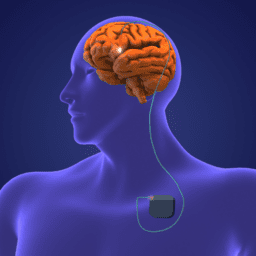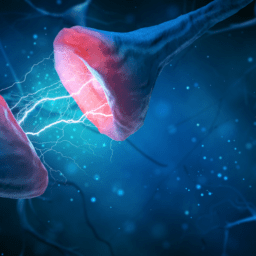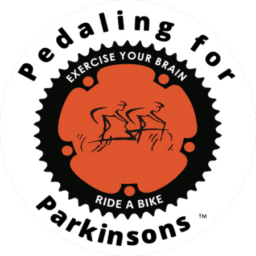Parkinson’s biomarker found! Differences between younger and older cohorts in NLY-01 trial. Focused Ultrasound to open the blood-brain barrier. Michael J. Fox documentary. The therapeutic pharmaceutical pipeline. ParkinSings. And Pedaling for Parkinson’s in Illinois.
PARKINSON’S SCIENCE AND RESEARCH NEWS
- Researchers published results of a study confirming α-synuclein seed amplification assays can reliably identify people with Parkinson’s, provide information about molecular heterogeneity, and detect prodromal individuals before diagnosis. This confirmation of an α-synuclein biomarker will aid in the development of new treatments, in identifying Parkinson’s subgroups, and in identifying people at risk for developing Parkinson’s. Here is an interview with Michael J. Fox about the subject and other topics. Also, a press release from Inhibikase Therapeutics announces that they have already developed plans to incorporate the seed amplification assay into two trials.
- Post-hoc analysis of efficacy measures by age group in Neuraly’s PRISM-PD study found that although the trial did not meet its primary end-point, data from the trial indicate a positive effect for participants under 60. The effect was statistically significant, dose-related, and persisted after treatment was discontinued. Neuraly notes that “these results suggest slower disease progression in NLY01-treated subjects compared to placebo-treated subjects in this age group.”
- Researchers report on their successful use of focused ultrasound to facilitate opening in the blood-brain barrier. The authors note that “the less-invasive nature of this methodology could facilitate focal viral vector delivery for gene therapy and might allow early and repeated interventions to treat neurodegenerative disorders.”
- A study published in the Journal of Neurology found differences in microRNA expression between men and women with Parkinson’s. This finding may indicate a role for microRNA expressions as biomarkers for disease progression and treatment response.
- When exercising in a low-dopamine state, people tend to exhibit increased variability of exertion and to over-report their levels of exertion. An article in npj reports that a person’s assessment of how much effort they exerted is influenced by dopamine availability.
- Researchers who conducted a systematic review of data about smoking, mortality, and Parkinson’s found that people with Parkinson’s who smoke do not have an increased risk of mortality from neurological complications, but that they do have an increased risk of mortality from smoking-related cancer. The authors write that their study indicates that, despite the persistent negative association between smoking and the risk of developing Parkinson’s, smoking is not recommended for people with Parkinson’s.
- A study report in Brain Communications found that asymmetrical hearing impairment in people with Parkinson’s is directly related to dopamine depletion.
- Obstructive Sleep Apnea is correlated with decreased dopamine levels in the caudate nucleus in people with Parkinson’s.
- An article in npj reports that DOPAL, a byproduct of dopamine metabolism, is a trigger for α-synuclein neurotoxicity.
- A report in Parkinsonism & Related Disorders finds that REM sleep behavior disorder predicts the likelihood of Parkinson’s-related cognitive impairment regardless of the age of Parkinson’s onset.
- Probiotic supplementation in mice increased branched-chain amino acid production, improved motor function, and decreased neuro-inflammation.
- Researchers at Qassim University have utilized artificial intelligence models to differentiate between people with Parkinson’s and people without Parkinson’s by evaluating voice recordings. Their method improved accuracy compared to previous attempts to diagnose Parkinson’s using voice pattern recognition.
- Interaction between α-synuclein and another protein (CHMP2B) in the endo-lysosomal pathway prevents the breakdown of α-synuclein. This discovery suggests that CHMP2B may be a treatment target.
- In Neuron, researchers discuss the mechanisms of cognitive impairment in Parkinson’s.
- A review in Movement Disorders explores what has been learned in recent years about punding in Parkinson’s. Punding is characterized by a fascination with complex, repetitive, non-goal-oriented activities.
- Researchers in the Journal of Parkinson’s Disease report on the correlations between cognitive impairment and care partner stress.
- NeuroscienceNews reports on the results of a study that challenges the idea that early Parkinson’s causes early onset of cognitive impairment.
- Researchers in Movement Disorders explore the prevalence and significance of the “lessebo effect” in disease modification trials. This is when the possibility of having received a placebo in a clinical trial negatively impacts the effect of treatments. By performing a meta-analysis of previous disease-modifying trials, the authors found no evidence of “lessebo effect.” The authors do, however, report that the absence of active comparator treatments in clinical trials is a limitation.
- In the Journal of Patient Reported Outcomes, researchers report on the development of two new patient-report outcome systems to assess daily functioning in people with early Parkinson’s.
- Data from motion sensors in smartphones and smartwatches has been used to passively measure symptom severity in Parkinson’s. Results were validated against symptom severity scores reported by physicians. More than 42 teams from around the world participated in the research.
- Researchers report on the need for and development of a gut dysmotility questionnaire for Parkinson’s in Frontiers in Neurology.
- In npj, researchers report on a discovery from research in rats that has found new pathological pathways involved in pain in Parkinson’s.
PARKINSON’S TREATMENTS and THERAPIES
- A new overview of formulations of Parkinson’s treatments is available here.
- The MJFF offers a glimpse into the therapeutic clinical pipeline for Parkinson’s. Highlights include that there are 146 unique therapies in clinical trials and that there are 13 active clinical programs investigating cell repair and/or cell replacement.
- Researchers from Austria and the United States produced a systematic review of pharmacological and surgical treatments to address tremor in people with Parkinson’s.
- A meta-analysis of the effectiveness of cueing to help with freezing of gait discusses the importance of recognizing that one solution to freezing of gait is not likely to work for all people with Parkinson’s.
- At the AAN conference, researchers reported that the combination therapy of Rasagiline and Pramipexole was similarly effective to treatment with Pramipexole alone but that the combined therapy had fewer adverse events.
- Professor Ludvic Zrinzo joined the Movers & Shakers podcast to talk about DBS.
PARKINSON’S LIVING WELL STORIES
- On April 12, Apple TV+ released Still: A Michael J Fox Movie. The film shares new insights into Fox and his family’s experience with Parkinson’s.
- US Congresswoman Jennifer Wexton announced on World Parkinson’s Day that she has been diagnosed with Parkinson’s. Her message about her diagnosis is available here.
- Comedian Richard Lewis announced that he is living with Parkinson’s. Here is a video of his announcement and a few words about his positive outlook.
- Grant Taylor, a UK-based writer and film director, brought the story of his father’s life with Parkinson’s to the screen in the film Ecstasy. The film recently won seven awards at a festival.
- NJ-based ParkinSings Choir uses music to fight against Parkinson’s.
- Connecticut Governor, Ned Lamont, issued a proclamation recognizing the need to raise awareness about Parkinson’s. The announcement was followed by multiple events around the Hartford area.
- Today.com featured a story about Vikas Chinnan’s journey to diagnosis with Parkinson’s and how the California-based father has responded to his diagnosis.
- A news report about a Pedaling for Parkinson’s group in Illinois describes the benefits the group conveys to participants.
PARKINSON’S SURVEYS, CLINICAL TRIALS, AND VOLUNTEER OPPORTUNITIES
- University of Rochester Center for Health + Technology is undertaking a survey study to assess the ability of the Parkinson’s Disease-Health Index to measure patient-relevant changes in disease burden over the course of two years. Participants will complete surveys five times over two years and must be over 18, speak English, and have a self-reported or clinical diagnosis of Parkinson’s. More information is available here.
- Are you a grandparent living with Parkinson’s while also serving as the primary caregiver for your grandchildren? Do you want to connect with people in similar situations? Let us know by filling out this form.
- Researchers at Columbia University’s Irving Medical Center are seeking participants for a study exploring the role of immune response in Parkinson’s. Participation is open to those with and without Parkinson’s and will involve donating blood, a questionnaire, a cognitive test, and a neurological examination. Click here to express interest in participating.
- John’s Hopkins has announced a trial to evaluate whether levetiracetam can improve symptoms of Parkinson’s psychosis. The trial is not yet recruiting, but the plan is for the trial to begin by September. The trial design features crossover assignment, which means that every participant will receive an active trial drug for part of the trial.
- The LUMA trial continues to recruit participants. This trial aims to assess the safety and efficacy of BIIB122 tablets in slowing the progression of early-stage Parkinson’s. This study has sites in the US, China, France, Germany, the Netherlands, Poland, Spain, and the UK.
- The ACTIVATE trial is recruiting participants for a phase 2 trial of BIA 28-6156 in people with GBA mutations. This 78-week trial has site locations in the US, Canada, and Europe.
- A report in PNAS describes the possible method of action for UCB0599, a treatment currently in a large phase II trial investigating a possible disease-modifying effect.
- In Colorado, a study the Foundation is funding continues to recruit participants. The study will explore low-load resistance training with blood flow restriction in order to help develop exercise interventions to help improve the quality of life for people with advanced Parkinson’s.
- Washington University School of Medicine is sponsoring a study that aims to enroll participants with idiopathic REM sleep behavior disorder, as well as healthy controls, to prepare for a trial of neuroprotective treatments against synucleinopathies.
- Florida State University is sponsoring a study of speech articulation deficits in Parkinson’s.
- A study in South Carolina aims to identify brain biomarkers to predict the risk of cognitive change following DBS surgery.
- A survey for those in Ireland seeks to understand the influence of Parkinson’s symptoms and other factors on the quality of life of people with Parkinson’s.
- A trial sponsored by the University of Aberdeen in Scotland is recruiting participants for a study of the effects of constipation and changes in microbiota in Parkinson’s.
- US-based company Neuronascent announced plans for a phase II trial of their neuro-restorative agent NNI-362. The agent is disease-agnostic, and a previous phase I trial for Alzheimer’s disease produced positive early-stage findings.
- Sinopia Biosciences announced that they have secured funding for a clinical trial to explore the safety and efficacy of their novel agent in treating levodopa-induced dyskinesia.
- Staying Connected through Communication Study – The University of Washington SPEAC Lab invites individuals living with Parkinson’s to answer survey questions about their communication experiences. This is an online survey study that will take about 30-45 minutes. (Paper surveys are also available.) People with Parkinson’s and their family/friends/coworkers will complete SEPARATE surveys, and data are not shared between participants. This study is open to anyone in the U.S. Each participant will be mailed a $25 check upon survey completion. Learn more and enroll here.
- PreActive PD Study – This study, available for both English and Spanish speakers, implements an occupational-therapist-delivered physical activity behavior change coaching intervention in people with early-stage Parkinson’s. The study is based upon a recent single-arm cohort feasibility study (Pre-Activate PD/HD) that evaluated acceptability, implementation, and resulting effect estimates of the Pre-Activate PD intervention in 13 participants. The intervention provides one-on-one coaching sessions from an occupational therapist to individuals newly diagnosed with Parkinson’s. The individualized structured support in the sessions is aimed at facilitating and optimizing exercise uptake as part of an effective self-management program. Learn more and enroll here.
- Gamma Wave Trial – Sponsored by the Massachusetts Institute of Technology (MIT), this trial will investigate the efficacy of a non-invasive method of neuromodulation called Gamma Entrainment Using Sensory Stimulation (GENUS) for managing Parkinson’s motor symptoms. GENUS is administered via light, sound, and tactile stimulation devices and has been tested on cognitively normal individuals and individuals with mild Alzheimer’s, and the device was found to be safe for use and effective for entrainment in both populations. Learn more here.
- YOPD Survey – A doctoral student in occupational therapy at Russell Sage College is conducting a research study to determine the impact of Young Onset Parkinson’s Disease on cognition, quality of life, and life roles. If you received a Parkinson’s diagnosis before age 60, you can learn more and complete the survey here.
- Phoenix-Area Residents – Deep Brain Stimulation (DBS) and Exercise Study at Barrow Neurological Institute – This study aims to help researchers learn more about how aerobic exercise affects symptoms of Parkinson’s and the quality of life in people who have DBS. They will also look at brain wave activity using the Medtronic Percept DBS device in order to better understand what changes in the brain might be caused by exercise and how that affects Parkinson’s symptoms. Reach out to Markey if interested.
- Colorado Oral Strengthening Device – The University of Colorado is looking for adults with Parkinson’s to participate in a research study exploring how a novel low-technology device can achieve an increase in tongue strength comparable to standard-of-care exercise using tongue depressors but with the kinematics and simple biofeedback of existing high-cost devices. Research has shown that tongue resistance exercises paired with biofeedback have resulted in improved tongue strength to support chewing, control of food and liquid in the mouth, and propulsion of material for a swallow. Learn more and enroll here.
- PD GENEration – The Parkinson’s Foundation has announced a major expansion of its national study to make genetic testing and counseling more available for people with Parkinson’s. The study (NCT04057794) hopes to enroll 15,000 people in all 50 US states, Puerto Rico, and the Dominican Republic. Details are available here. For questions about enrollment, email genetics@parkinson.org. Know someone who speaks Spanish and wants to learn more and maybe participate in the study? Share this link.
- Parkinson’s Progression Markers Initiative – In an expanded study, the Parkinson’s Progression Markers Initiative (PPMI) is currently working to enroll up to 100,000 people with and without Parkinson’s. The study team is especially seeking to enroll people diagnosed with Parkinson’s in the past two years and who are not yet on treatment, as well as people 60 and older who aren’t living with Parkinson’s but have a risk factor for it (such as a close relative with Parkinson’s, a known Parkinson’s-associated mutation, and/or REM sleep behavior disorder). The observational study is also enrolling people with no known connection to Parkinson’s to serve as a control group. Learn more here.
- TOPAZ (Trial of Parkinson’s and Zoledronic Acid) – Caroline Tanner, MD, PhD, is recruiting participants for a new remote clinical trial led by a team of Parkinson’s experts at UCSF in partnership with researchers from across the country. The study aims to help people with Parkinson’s or parkinsonism maintain their independence by reducing the risk of hip fractures. The study will test if zoledronate, an FDA-approved medication for osteoporosis, can prevent fractures in people with Parkinson’s, whether or not they have osteoporosis. To learn more, visit the study website at TOPAZstudy.org, email TOPAZ@ucsf.edu, or call (415) 317-5748.
- Join Google and LSVT in Project Euphonia – LSVT Global has partnered with Google on an exciting research project called Project Euphonia to help improve automatic speech recognition software for people with speech disorders. These disorders may make using devices like Google Home, The Nest, and other Smart devices, Siri, Alexa, or speech-to-text frustrating. To do this, LSVT Global needs samples of disordered speech to train the system. You are encouraged to enroll if you’ve been diagnosed with Parkinson’s, PSP, MSA, or CBD with mild, moderate, or severe speech disorders. Participation is easy, can be done from your own home, and can earn you a $60 gift card! Learn more here.
- G2019S LRRK2 Parkinson’s: Increasing Awareness and Genetic Testing Program – This program aims to support the development of precision medicine intended to treat people with genetic forms of Parkinson’s. Up to 15% of cases of Parkinson’s disease have an underlying genetic cause, yet many people have never had genetic testing. This research program will be very important in supporting the future development of a new oral precision medicine treatment for one of the most common genetic forms of Parkinson’s, aimed at slowing its progression. To learn more, visit geneticpd.com.
- A PD Avengers research group is undertaking a new project called Sparks of Experience, designed to be more systematic about collecting and considering the experiences and ideas that come from the curious minds of people living with Parkinson’s. “In the past, these sometimes quirky ideas inspired by lived experience have turned into significant new directions for research. It could be said we are trying to capture serendipity,” the team says. To learn more and get involved, see the flyer here.
- Game-based Exercise Project – Researchers at the University of Auckland are investigating how games can be used as potential rehabilitation systems. This project aims to develop suitable game-based exercise experiences to help people living with Parkinson’s. If you are 45 or older, living with a chronic condition such as Parkinson’s, and/or are experiencing age-related health conditions, you are invited to participate in a survey that will help the researchers to understand the community’s interests in games and gameplay in the context of exercise and rehabilitation. To learn more and take the 15-minute survey, see the flyer here.
- SPARX3 – A Phase 3 Clinical Trial about Exercise and Parkinson’s – This research team is currently seeking volunteers to participate in a clinical trial about the effects of aerobic exercise on people with Parkinson’s. Learn more and see if you qualify here. For more details, contact Katherine Balfany at SPARX3@ucdenver.edu.
- PAIRing Up – If you are a person with Parkinson’s or a care partner to someone with Parkinson’s, you are invited to participate in an online survey to address neuropsychiatric (cognition, depression, anxiety) concerns in Parkinson’s. The survey aims to learn about the needs and priorities for clinical care, education, support, and research related to neuropsychiatric symptoms. To learn more and participate, click here to download the flyer.
- A multidisciplinary research team in the UK is investigating how to best use music to help people with Parkinson’s manage symptoms related to movement and mood. This includes research about music for dancing and is the first study to incorporate the new Dance Sophistication Index for people with Parkinson’s. To learn more and take a 30-minute survey, click here.
- The University of Oulu and collaborators from Aalborg University, Fraunhofer University, the University of Manchester, the University of Glasgow, the University of Lisbon, and the University of Melbourne, are conducting a survey for people with Parkinson’s and Parkinson’s care partners about self-care. Complete the survey here to share your self-care strategies and techniques. You can also review ideas submitted by others and add them to your own self-care toolbox.
- Home-based Exercise and Cognitive Behavior Therapy – University of Alabama in Huntsville
- Speech and Telemedicine Study – The Purdue Motor Speech Lab
- Parkinson’s and Service Dogs – University of Groningen, Netherlands
- Neurology Study Interest Registry – University of Rochester
- Park Test – University of Rochester
For more of what’s new in Parkinson’s news, check out our full series here.
WANT MORE PRACTICAL ARTICLES LIKE THIS?
You can learn much more about living well with Parkinson’s today through our Every Victory Counts® suite of resources. Each manual is packed with up-to-date information about everything Parkinson’s. Click the link below to order your manual(s).

















